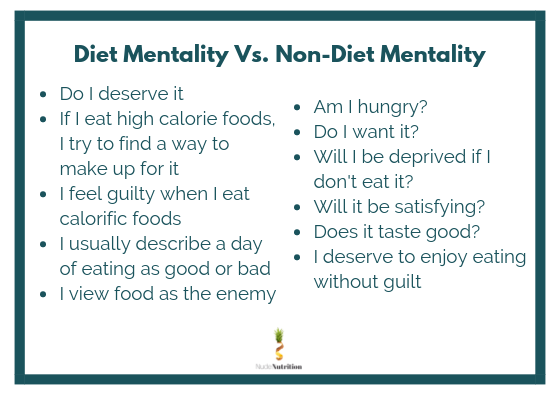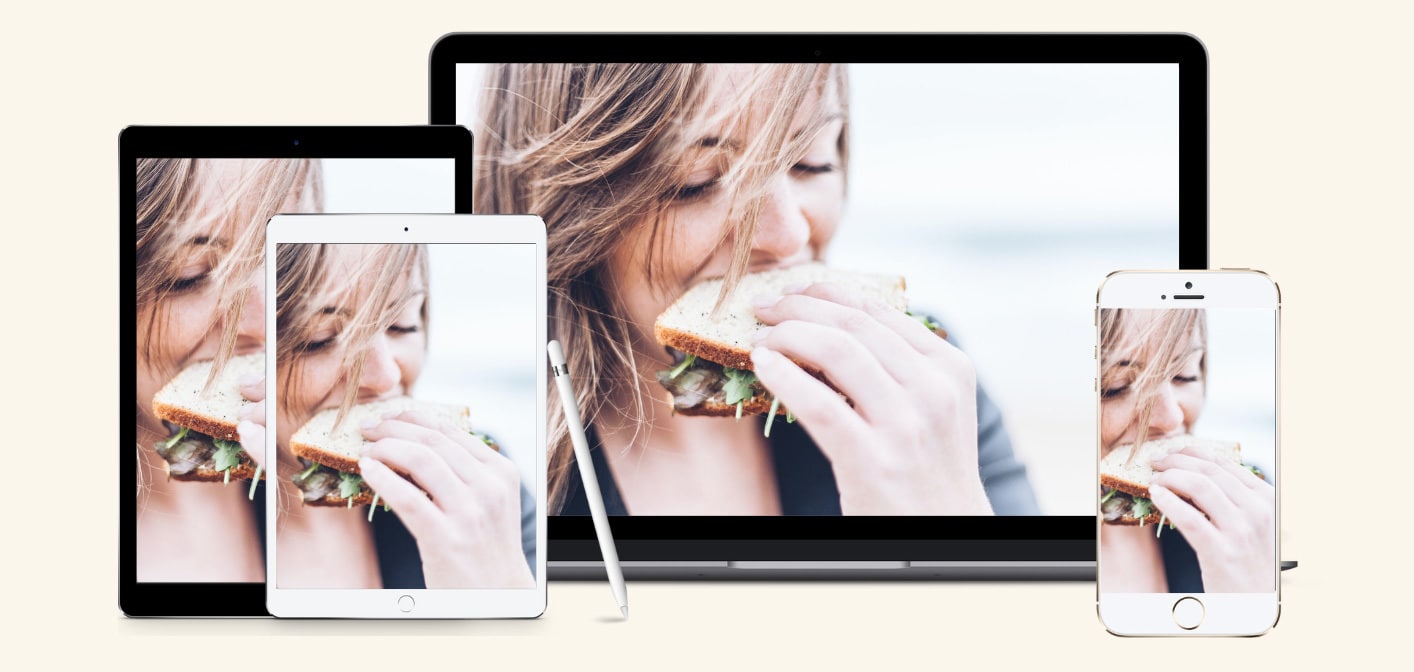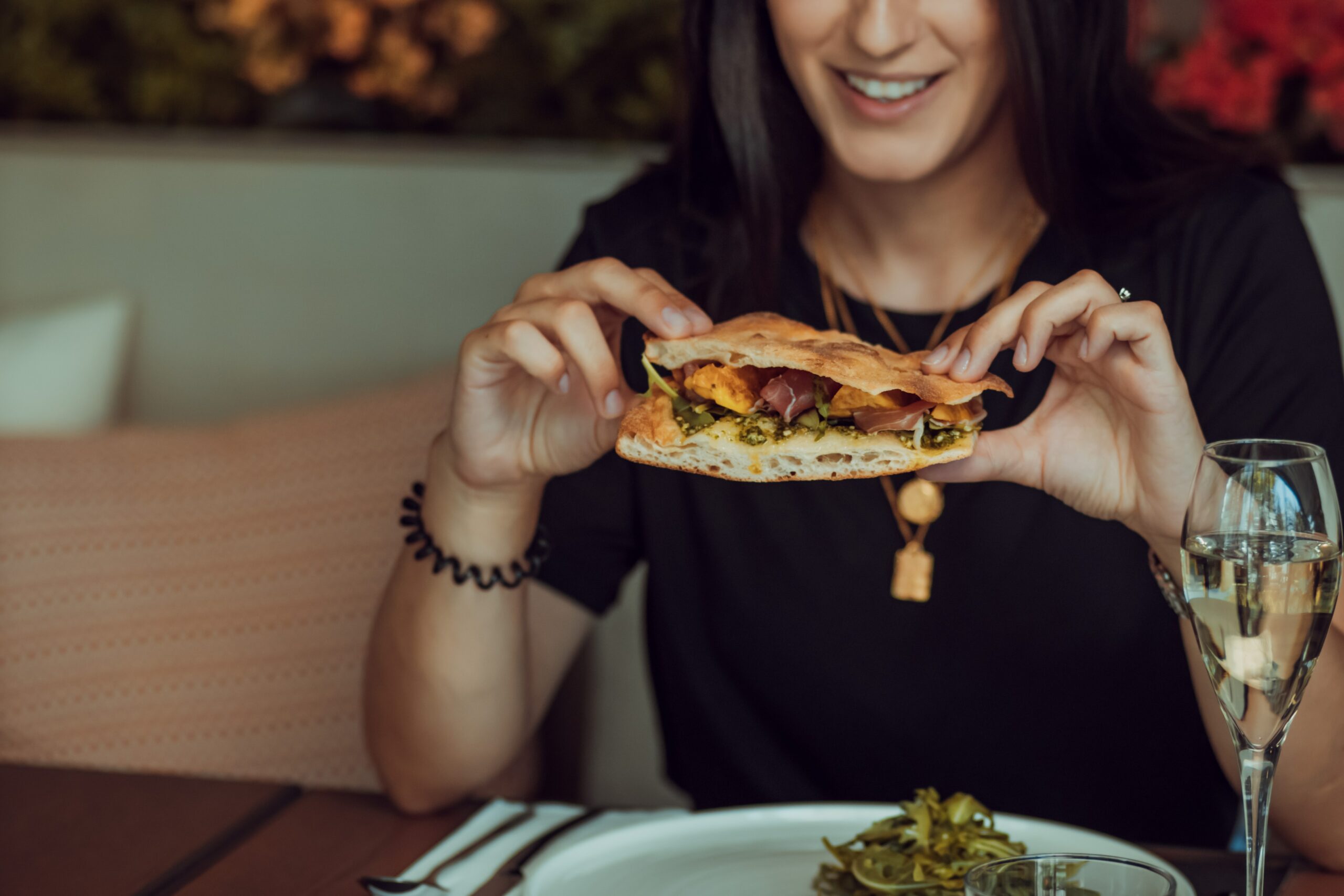By Katherine Kimber, Registered Dietitian & Founder of Nude Nutrition
What is a food obsession?
Food obsession can be:
– Always thinking about, talking about and planning your next meal
– Only allowing yourself to eat certain foods and labelling them “good” and “bad”
– Not being able to concentrate on tasks, especially if you know the “bad” foods are in the house
– Not enjoying social occasions if there are “bad” foods present
– Declining those social occasions in the future, because of the stress of not knowing what you can eat
– Constantly thinking about how you can get yourself to eat less
Can you identify with any of these?
If you’re wondering how to stop thinking about food, or why you can’t stop eating when full, you’ve come to the right place.
Food obsession is common, all-consuming and exhausting.
I have been there myself, and as a Registered Dietitian, I work with 100’s of people to help them move away from it. I know that swinging between “diet land” and “doughnut land” is no fun.
In this article I am going to cover; what food obsession is, how it comes about, and how to stop food obsession.
Why am I obsessed with food?
Obsessing over food happens when we place rules around what and how much we eat. These rules can be self-inflicted rules that we’ve picked up over the years, or stem from an external source (e.g. a diet/pursuit of weight loss).
Restriction can be physical or psychological.
a) Physical restriction: when the food is “forbidden/not allowed” and you are physically prevented from eating it (by yourself or others). E.g. no lunch before 12 ‘clock, no carbs after x time, points, calorie or meal limit.
b) Psychological restriction: when certain foods are labelled as “naughty” or “bad” and we carry guilt and anxiety for wanting to eat them, or actually eating them.
If you’re in the latter, chances are that diet culture has taught you to label foods as “good” and “bad”. This is where we feel “good” for eating a salad, and “bad” for eating a cookie. Placing a moral value on foods can interfere with our relationship to food in a negative way.
What happens when we restrict as a result of these food rules?
More often than not, food restriction leads to feeling deprived which leads to binge eating. Before you know it, you’re in the continuous restrict/binge cycle that looks like…
a) Restrict: eat less than usual/eat only certain types of foods/try to be “good” or “healthy”/cut out certain foods or food groups/fill up on low-calorie foods.
b) Struggle: feel obsessed with food, feel hungry, constantly think about the food, and more annoyingly, the food you’re actively trying to avoid.
c) Binge: cave into cravings, eat more than usual, feel out of control, eat all of the foods you’re actively trying to avoid.
d) Feel bad: feel guilty, ashamed, full of regret, tell yourself you’ve got no willpower.
e) Repeat: start back at a).
Sound familiar?
The initial restriction can make us become totally obsessed with that food. This food obsession can cause a bucket load of different emotions too.
Obsession with food can affect our mood and our relationships. It can affect our energy levels and desire to exercise. It can cause tainted memories of special occasions because you weren’t able to truly enjoy yourself because the food that was present controlled you. It is time-consuming. It can make you feel alone, lost and helpless.
It can make you feel as though there is No. End. In. Sight.
This is no way to live.
So how can you stop food obsession?
The crux of it is giving yourself permission. This is how to stop thinking about food all the time.
And I dive DEEP into all of this in my bespoke one-to-one nutrition coaching program, Reclaim Your Intuition.
Because when we label foods as “good” and “bad”, we feel “good” for eating a salad, and “bad” for eating a cake. When we let go of this moral value and see foods as neutral, we get to actually taste the food and ask questions like “am I hungry?”, “do I want it?”.
It’s time to unlearn the food rules that have dictated which foods are “good” and “bad” so that you can finally enjoy all foods that make you feel good. This sounds scary, I know. The biggest fear is that we will just eat ‘junk food’ all the time. Whilst it may feel that is the case in the short term, this dissipates as time moves on. This process is called habituation – it’s a scientifically proven thing!
I am going to use a non-food example to explain habituation.
Imagine buying a new top that you love…
When you first wear it, it feels exciting!
Maybe you even wear it more than normal at first, however, after time it heads into the draw with all of your other clothes. It still feels nice to wear at times, but you’re not obsessed with it like you were at first. The same happens with food. When we allow it in, we get used to it and whilst it may still taste good, it becomes less exciting.
Let’s look at an example…
Say chocolate is your “forbidden” or “bad” food that you feel obsessed with. Be specific about the brand, type and flavour of chocolate. Because if you’re introducing chocolate buttons, chocolate biscuits, chocolate toffees, chocolate icing all at once it will take you 4 x as long to become habituated to it. Be specific about the brand a flavour!
Next, plan out when you would like to practice eating it whilst giving that chocolate your undivided attention. Perhaps at a time when you’re not too vulnerable (I.e. stressed, tired or hungry). 30-60 minutes after a meal is a good time.
Practice eating that food paying attention with all the senses. Give yourself permission to eat as much as you want. Over multiple days repeating this practice, chocolate will gradually become less exciting.
As an Intuitive Eating Coach, this is where I guide my clients through a mindful eating exercise. It’s amazing to hear what flavours, textures, smells and emotions people notice when they pay attention. Eating mindfully and without judgement allows my clients to identify firstly, whether they actually like the food, and secondly, how much of that food is necessary for them to find the point of satisfaction.
In Summary
Stopping food obsession can take time, but it’s possible when we stop restricting ourselves. It takes time to feel comfortable allowing “forbidden” foods back into our life – particularly if you’ve immersed in diet culture for many years. It’s not about training yourself to eat less, or finding more distraction from eating. It’s about getting your needs met, honouring your hunger, and giving yourself more permission. And this is not something that has to be done perfectly or all at once. It is a process to help you realise that you can trust your body and realise that food doesn’t have to control you. Once you stop restricting, food obsession will fade and you can start to enjoy all the fun, meaningful things in life again.








